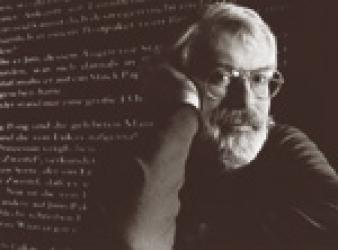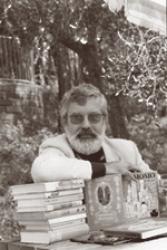Literary Success
 Michael Ende, 1980
Michael Ende, 1980 Michael Ende, 1978/79
Michael Ende, 1978/79Michael Ende was by no means the first writer to find popularity burdensome, but on occasions the intrusion into his private life became intense. Enthusiastic readers would make the pilgrimage from Germany to visit ‘their author’ in Rome. Turning up at Ende’s villa in Genzano, they entered the grounds unannounced and strolled into the house. ‘Once they’ve ticked off the Basilica, it’s time to visit Ende,’ the author once commented. ‘Before I know it, I’ve got mum, dad and the kids just metres away from me, watching while I eat.’ Ende was aware that his life was becoming public property, but found it hard to get rid of his readers, especially since they often took offence.
A mountain of post gathered every day, usually from enthusiastic readers who congratulated him on his work, asked questions about individual passages, and wanted to know more about his ideas. But Ende also received letters from people asking him to share their problems, whether psychological, financial, romantic, clinical, philosophical or political in origin. At first Ende replied to each and every letter, although he was soon forced to be more selective as the volume of mail increased. He was helped with the correspondence by Traude Hocke, wife of Michael Ende’s neighbour, art historian Gustav René Hocke. Meanwhile Michael Ende’s profile continued to rise. On 11th January 1981 Der Lindwurm und der Schmetterling oder Der seltsame Tausch (‘The Dragon and the Butterfly’), a three-act play with music by Wilfried Hiller, was premiered at Regensburg’s municipal theatre. The play was directed by Detlef Mejerjohann, and has since been performed over three hundred times, including at theatres in Darmstadt, Zurich and Salzburg. The accompanying picture-book, with illustrations by Manfred Schlüter, was praised by the Institute of Book Design for its high aesthetic merit.
In April 1981 Jewish theologian Friedrich Weinreb visited Michael Ende and his wife in Genzano. For Ende, it was a decisive encounter, and from then on he attended Weinreb’s Brunnenhof seminars in Zurich, where Weinreb taught a cabalistic interpretation of the Old Testament. Ende later commented that it was thanks to Weinreb that he discovered the full import of his Christian faith. In the course of 1981 Ende’s Tranquilla Trampeltreu, die beharrliche Schildkröte (‘Tranquilla Trampletrue - The Persistent Tortoise’), a musical fable in rondo form, was premiered at the municipal museum in Munich. The story was published under the same title as a picture-book with musical score. In 1981 Michael Ende received the European Youth Fiction Prize for The Neverending Story. He was also awarded the Janusz Korczak Prize for his corpus of work. That year Ende and Wilfried Hiller were presented with the German Youth Gramophone Prize for Tranquilla Trampeltreu and Der Lindwurm und der Schmetterling.
Ende was greatly moved by the award of the Janus Korczak Prize. The prize had been set up in 1979 to commemorate the life of Janus Korczak, a Polish-Jewish educator who had risked his life in order to stay with the children of his orphanage in the Warsaw ghetto. When the children were deported to Treblinka, he accompanied them of his own free will and was killed in the gas chambers.
Erhard Eppler, a Social Democrat politician, and Hanne Tächl, director of the community theatre (kontaktt(h)eater) in Stuttgart, visited Michael Ende in November 1981 and engaged in a lengthy discussion about imagination, culture and politics. In 1982 the exchange was published in book form. The early 1980s was the era of anti-nuclear protests, and many protesters took to the streets clutching copies of Momo. Various German and Italian political parties tried to enlist the support of Michael Ende, but he resolutely maintained his independence as a writer.
Die Schattennähmaschine (‘Sewing Machine of Shadows’), a lavishly illustrated picture book of Ende’s poetry, was published in 1982. The illustrations and design were the work of Binette Schroeder. In Japan The Neverending Story was nominated as best contemporary novel in translation. One of the translators was Mariko Sato, whom Ende later married. In Italy Ende was awarded the Lorenzo il Magnifico Prize and the Bronzi die Riace Prize for his oeuvre, whilst in Germany he was selected as author of the year.
1982 also saw the foundation of Weitbrecht Verlag, a new imprint of K. Thienemanns Verlag, established by Hansjörg Weitbrecht, Gunter Ehni and Roman Hocke. One of the first books to be published was Ende’s 1976 play, Das Gauklermärchen (‘The Entertainer’s Tale’). Over the next few years the imprint published numerous works of fantasy literature as well as Michael Ende’s books for adult readers.